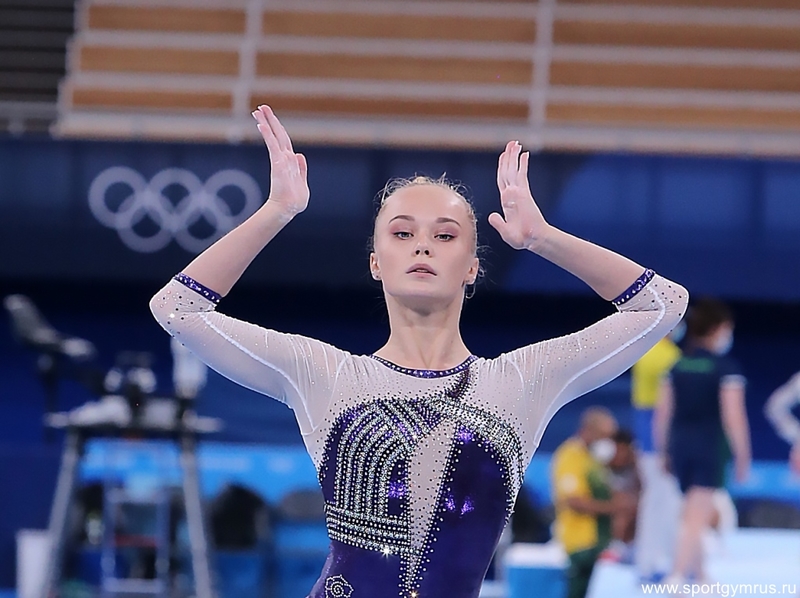Melnikova talked to PeopleTalk website after returning from Tokyo.
She recalled that while physically, the postponement was a good thing, mentally, it was extremely hard for her:
“It was hard to endure these Olympics psychologically. The Games were postponed by a year, it’s an enormously long period of time for an athlete. But the postponement was favorable for my body. In two months I didn’t train during the lockdown, my minor injuries healed and my body became healthier. But ti imagine another year and a half of training instead of six months was hard. We training at the locked-down training center where people from the outside were not allowed because of the pandemic. For months, we didn’t see anyone, even our families, and only phones were our saviors. I’m an active person, I am always interested in something, but before these Olympics, I felt apathetic for the first time, when I only wanted to lie down after practices. I lived from practice to practice, and for me, this is the same as degeneration.”
The pandemic atmosphere and competing under the NOC flag affected her as well:
“At the previous Olympics, there was a feeling of team spirit, that we’re one country. This time, we competed under the neutral flag and not everyone recognized us. Other athletes came up to us and asked, “What country are you from?” It was weird. Usually, people recognize us from far away, but this time, it was like we were in a shadow, even though, inside, we all competed for Russia.”
Melnikova believes the experience she’s accumulated since Rio-2016 helped her in Tokyo:
“I have impressive experience, I’ve competed for five years with no breaks, without missing a single major competition. Because of that, at competitions, I feel calm, if I’m in a good shape, and a bit of anxiety even keeps me on my toes and helps me focus. Competing is the hardest when you’re injured. I always worry about my health, because without it, my career would end. The main guidance from my coach is to protect myself.”
She talked about how sometimes dedicating herself to gymnastics was very difficult growing up:
“I wanted to be a regular teenager, especially during puberty. Hormones are raving, it’s harder to train, it’s impossible to keep your weight in check, and you think, “God, regular people are happy, and what about me?” But since childhood, athletes get used to overcoming themselves, fighting difficulties and never giving up. My dedication helped me.”
“I wanted to quit it all once, when I was nine years old. I remember how my ear hurt and it was painful to flip, but I didn’t tell any of the coaches this, endured it, and only cried at home and said that I would not train anymore.”
While she wants more kids in Russia to do gymnastics, she’s not sure she would let her future kids become elite athletes:
“I don’t know if I’ll let my kids to do elite sports. First, you have to overcome pain, fatigue, and stress, it’s hard. Second, only a few out of all the athletes become champions. If I had a guarantee that my kids would become champions, then, perhaps, I’d take this risk.”
Experience also helps her to deal with various issues in gymnastics:
“When an element isn’t working out for me, I just describe it in words out loud and add that it will definitely work out tomorrow. I used to get really upset and repeat the routine over and over to the point of exhaustion, but now I take it easier – if it doesn’t work out, then next time.”
“Once, at a competition, I forgot which foot I start the run with. I made a step back and completely forgot where I am, but then I did everything on the autopilot – such things happen because of the nerves.”
“Now I understand that the most important thing is to listen to yourself. Sooner or later you get tired from the advice of coaches, parents, and other people, and you need to know how to listen to this inner voice, it doesn’t let you down. I live my life with the thought that I do everything only for myself. It’s not selfishness, it’s just you get exactly as much as you give.”
In this interview, she talked about getting some rest after the Olympics. Later, it turned out she didn’t have long to rest, because she returned to Round Lake and plans to attend the upcoming World Championships.
“After the Olympics, I want to rest, relax, get back into the routine and understand what I really want to do next, and also to find psychological motivation to keep my spirits up.”
“I’ve been in this sport my whole life, it’s probably enough. Although, I’m sure that I won’t be able to leave it completely. After the retirement, I would like to grow in other fields, for example, in academic studies which I missed because of training. I also really like fashion design, creative endeavors. When you do only one thing, you look at the other world with dancing, drawing, and travel with longing, you want to try it all. But I know I have my own path. I like doing everything deliberately, I can’t stand acting rashly. So, I need to think about everything carefully. After all, one needs to be born an athlete. And I was born an athlete.”
Photo: Russian Artistic Gymnastics Federation
Support Gymnovosti on Patreon from only $1 a month and help us bring to you even more awesome gymnastics coverage!



